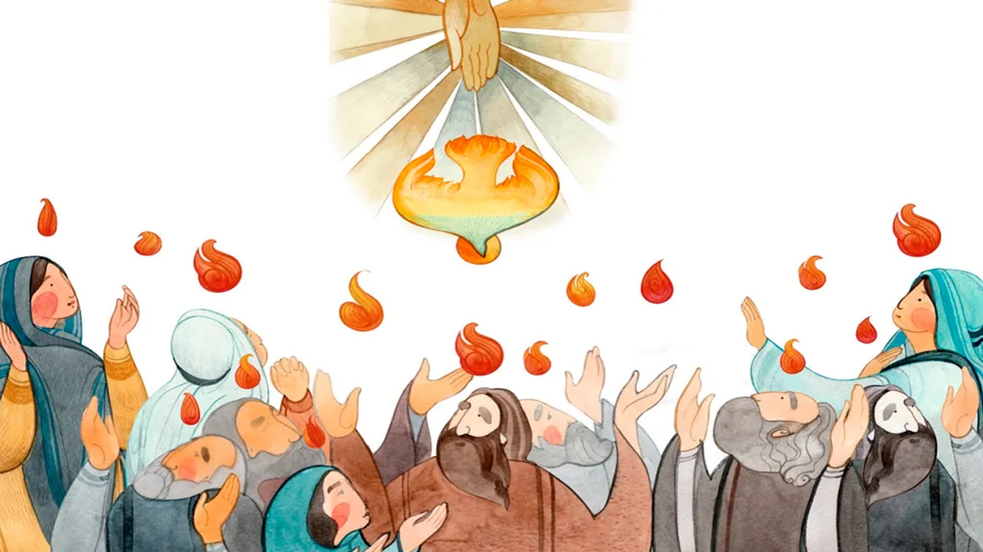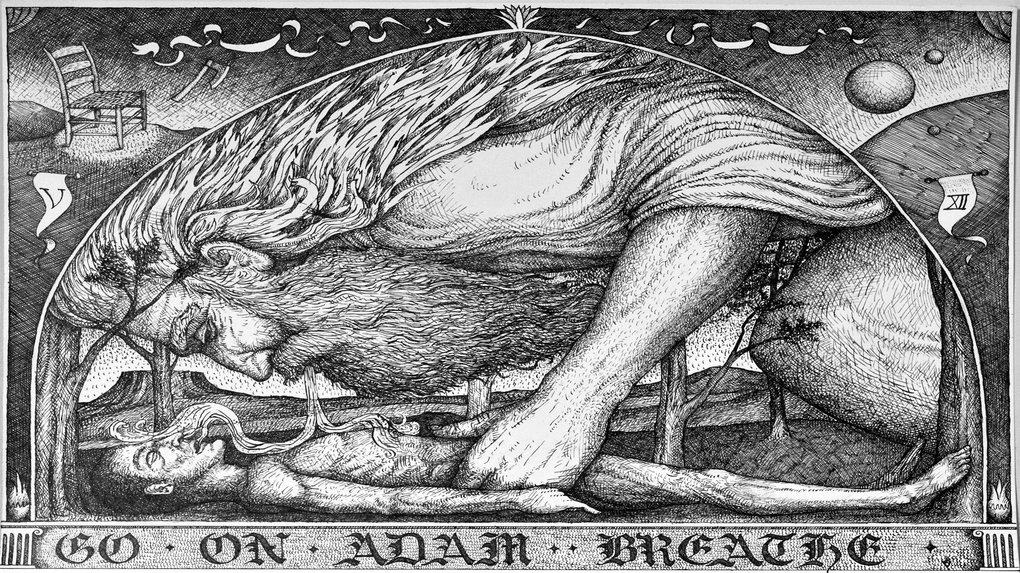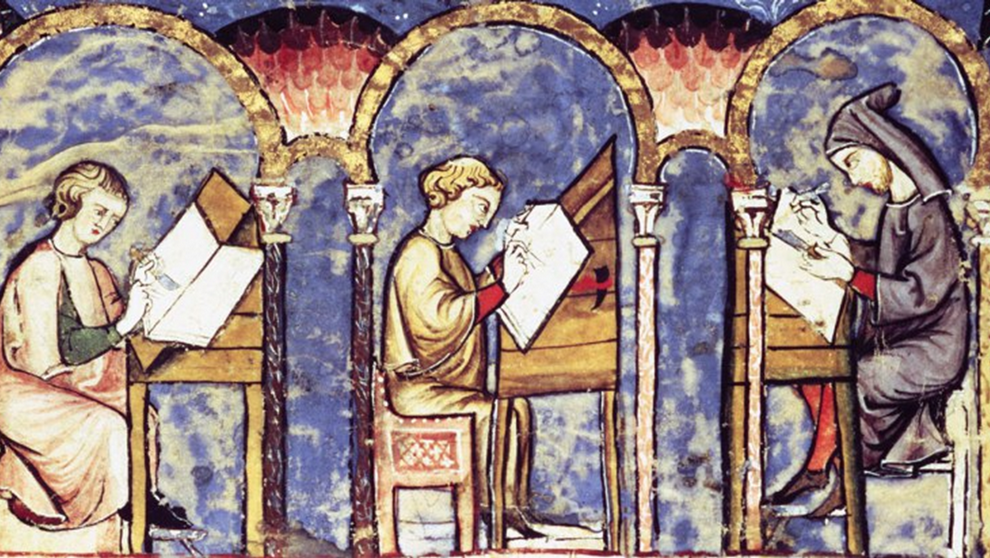Spirit of Hope
OT Lesson: Ezekiel 37:1-14 (GNT)
I felt the powerful presence of the Lord, and His Spirit took me and set me down in a valley where the ground was covered with bones. He led me all around the valley, and I could see that there were very many bones and that they were very dry. He said to me, “Mortal man, can these bones come back to life?”
I replied, “Sovereign Lord, only You can answer that!”
He said, “Prophesy to the bones. Tell these dry bones to listen to the word of the Lord. Tell them that I, the Sovereign Lord, am saying to them: I am going to put breath into you and bring you back to life. I will give you sinews and muscles, and cover you with skin. I will put breath into you and bring you back to life. Then you will know that I am the Lord.”
So I prophesied as I had been told. While I was speaking, I heard a rattling noise, and the bones began to join together. While I watched, the bones were covered with sinews and muscles, and then with skin. But there was no breath in the bodies.
God said to me, “Mortal man, prophesy to the wind. Tell the wind that the Sovereign Lord commands it to come from every direction, to breathe into these dead bodies, and to bring them back to life.”
So I prophesied as I had been told. Breath entered the bodies, and they came to life and stood up. There were enough of them to form an army.
God said to me, “Mortal man, the people of Israel are like these bones. They say that they are dried up, without any hope and with no future. So prophesy to my people Israel and tell them that I, the Sovereign Lord, am going to open their graves. I am going to take them out and bring them back to the land of Israel. When I open the graves where my people are buried and bring them out, they will know that I am the Lord. I will put my breath in them, bring them back to life, and let them live in their own land. Then they will know that I am the Lord. I have promised that I would do this—and I will. I, the Lord, have spoken.”
NT Lesson: Acts 2:1-21 (NRSV)
When the day of Pentecost had come, they were all together in one place. And suddenly from heaven there came a sound like the rush of a violent wind, and it filled the entire house where they were sitting. Divided tongues, as of fire, appeared among them, and a tongue rested on each of them. All of them were filled with the Holy Spirit and began to speak in other languages, as the Spirit gave them ability.
Now there were devout Jews from every nation under heaven living in Jerusalem. And at this sound the crowd gathered and was bewildered, because each one heard them speaking in the native language of each. Amazed and astonished, they asked, ‘Are not all these who are speaking Galileans? And how is it that we hear, each of us, in our own native language? Parthians, Medes, Elamites, and residents of Mesopotamia, Judea and Cappadocia, Pontus and Asia, Phrygia and Pamphylia, Egypt and the parts of Libya belonging to Cyrene, and visitors from Rome, both Jews and proselytes, Cretans and Arabs—in our own languages we hear them speaking about God’s deeds of power.’ All were amazed and perplexed, saying to one another, ‘What does this mean?’ But others sneered and said, ‘They are filled with new wine.’
But Peter, standing with the eleven, raised his voice and addressed them: ‘Men of Judea and all who live in Jerusalem, let this be known to you, and listen to what I say. Indeed, these are not drunk, as you suppose, for it is only nine o’clock in the morning. No, this is what was spoken through the prophet Joel:
“In the last days it will be, God declares,
that I will pour out My Spirit upon all flesh,
and your sons and your daughters shall prophesy,
and your young men shall see visions,
and your old men shall dream dreams.
Even upon my slaves, both men and women,
in those days I will pour out my Spirit;
and they shall prophesy.
And I will show portents in the heaven above
and signs on the earth below,
blood, and fire, and smoky mist.
The sun shall be turned to darkness
and the moon to blood,
before the coming of the Lord’s great and glorious day.
Then everyone who calls on the name of the Lord shall be saved.”
Sermon
Photo Contest
Good morning. Before I begin my sermon, I have an announcement regarding our photo contest. So far, I have received 19 entries. The contest is still open, and you are welcome to email me your flower photos at any time. The 19 submitted photos are colour-printed and displayed on the wall right outside the sanctuary.
The voting day is Sunday, June 16th, which is Father’s Day. However, just like in Indiana State elections, we have an Early Voting option. You can vote anytime from now until Father’s Day, June 16th. There are small dot stickers available, and you can place a sticker on your favourite photo. Unlike Indiana State voting, you do not need to be registered in Boone County, and there is no ID check. Everyone gets one vote, and it operates on an honour system. While there is no penalty for voting multiple times, I trust that we, as Presbyterians, are honourable people.
On June 23rd, the Sunday following Father’s Day, we will announce the winner during our Worship at the Park with Central Christian Church. The winner will receive a prize. Additionally, you can view all the flower photos on the church website.
Introduction
Now, let me greet you again: Good morning! Today is Pentecost, the day we celebrate the coming of the Holy Spirit upon all believers, ten days after Jesus’ ascension into heaven. As we mentioned earlier, today is the birthday of the church—not just this church or any specific church, but the universal church, encompassing all Christian denominations such as Presbyterian, Lutheran, Pentecostal, Baptist, Catholic, Orthodox, Anglican, Dutch Reformed, Episcopalian, and more.
Some people say that having so many different denominations is a curse. That may seem true at times. However, God has the power to turn things around, transforming curses into blessings, mourning into joy, tears into dancing, and spears into ploughshares. Each denomination has its own distinct theology and understanding. Though we may not fully agree with other theologies, they can deepen our understanding of God. Just as a group of blind people each touching a different part of an elephant cannot grasp the full picture alone, no single theology or denomination can fully comprehend the divine. When we come together in harmony, we gain a better picture and a deeper understanding of our God, who is greater than the universe and beyond the capacity of our minds. Therefore, diverse theology and understanding are crucial.
Meaning of Speaking in Tongues
The amazing thing about Pentecost is the inherent diversity from the very beginning. The Old Testament focuses on the Jews, and even though Jesus did not exclude the Gentiles, He emphasised that He came for the Jews first. However, the very first act of the Holy Spirit, when He descended upon the 120 believers, was enabling them to speak in various foreign languages. The Bible lists some of these languages, but if everyone spoke a different language, that could mean up to 120 languages unless they switch languages in between during speaking in tongues.
This diversity signifies inclusion. Imagine yourself being in Jerusalem two thousand years ago, witnessing Pentecost and hearing people praising God in many different languages. Suddenly, you hear someone praising God in English or in my case, Korean. You would immediately feel included in Pentecost, even if you are not speaking in tongues at that moment. That was the exactly the response of the crowd at the Pentecost: ‘Hey, I hear my language! Me too1 Me too!’ Now you would not only understand but also feel that you are included in God’s grace and the love of Christ. In this way, the Holy Spirit included everyone in the salvation of God, no matter where they were from. The Holy Spirit embraced everyone and made them feel included by presenting Himself in diverse languages. Apostle Paul, filled with the Holy Spirit, did the similar approach that he wrote in his first letter to the church in Corinth, “To the Jews I became as a Jew, in order to win Jews. To those under the law I became as one under the law though I myself am not under the law so that I might win those under the law. To those outside the law I became as one outside the law though I am not free from God’s law but am under Christ’s law so that I might win those outside the law. To the weak I became weak, so that I might win the weak. I have become all things to all people, so that I might by any means save some.” So the Holy Spirit included everyone by presenting Himself in all languages.
Included in Hope
Then where does the Holy Spirit include us? Filled with the Holy Spirit, the apostle Peter preached to the gathered and amazed crowd, quoting the words of the prophet Joel. He concluded with a message of hope: “Everyone who calls on the name of the Lord shall be saved.” This is a word of hope and inclusion. Peter did not say ‘every Jew,’ but ‘everyone.’ Therefore, anyone regardless of their racial background can be saved in the name of the Lord. Thus, we are all included in divine hope by the inclusion of the Holy Spirit, regardless of our ethnicity only if we accept the Holy Spirit into us.
Today’s Old Testament lesson is the famous passage from Ezekiel. The valley is filled with dry bones, representing a situation devoid of hope. These bones symbolise people who are already doomed, with no chance of change. God tells Ezekiel that the Israelites are like these dry bones—dried up, without hope or a future. Sometimes we also feel this way, believing we have no hope or future, feeling like nothing more than dry bones. However, God’s message does not end with this grim reality. The divine message brings hope. By the power of God, Ezekiel prophesied the wind and the breath entered the dead bodies. And they came alive, back to life.
You might wonder why Ezekiel prophesied to the wind but the breath, not the wind, entered the bodies. In Hebrew, the wind is רוּחַ (Ruach). The breath is also רוּחַ (Ruach). And there is one more. The spirit is רוּחַ (Ruach). The Holy Spirit is רוח הקודש (Ruach Ha-Kodesh), the Spirit of the Lord is רוח יהוה (Ruach Adonai). So, the Hebrew Bible reads: Ezekiel commanded the Ruach, and the Ruach entered the dead bodies, bringing them to life. So when he asked for the Holy Spirit, the Holy Spirit came in just like on the first Pentecost that when the believers prayed for the promised Holy Spirit, then the Holy Spirit came down on all believers. As the Holy Spirit entered the dead bodies, those dry bones came into life.
There is a similar event in the Bible. Genesis 2:7 says that the Lord God formed Adam from the soil and breathed into his nostrils the Ruach of life or the Spirit of life, and Adam became a living being. The Holy Spirit is the life-giving Spirit. Adam was not alive until the Holy Spirit entered him. The dry bones were not alive until the Holy Spirit entered them, bringing them back to life. With the Holy Spirit, they are alive, they have hope, and they have a future. Likewise, only when we have the Holy Spirit within us, then we are alive; we have hope and we have a future.
Returning to Peter’s sermon, I believe it is the perfect message for the church’s birthday because a newborn baby symbolises hope. When a healthy baby is born, the parents are filled with new hope. Everyone around the baby is also filled with joy. Newborn babies continue the family legacy, and one day, they will have their own children, perpetuating this cycle of hope and joy.
Church Giving Hope
At the beginning of His ministry, Jesus read from Isaiah to the people in a synagogue, outlining His mission and, by extension, that of the church through the Holy Spirit. The Scripture reads, “The Spirit of the Lord is upon me … to bring good news to the oppressed, to bind up the broken-hearted, to proclaim liberty to the captives, and release to the prisoners.”1 In essence, giving hope is the mission of the church through the Holy Spirit.
Since the birth of the church on the first Pentecost, the church has been a beacon of hope for many people. During the persecution under the Roman Empire, the church provided for the poor, cared for widows and orphans, and offered a sense of community and belonging to those who were often excluded. The church gave hope to those who were socially marginalised. The church also gave hope to those who were physically dying by showing hospitality to the sick. The church became renowned for its hospitality. People began to call the church the hospitality, from where the English words ‘hospital’ and ‘hospice’ derived. Including the excluded, welcoming the un-welcomed and showing hospitality were the primary missions of the church from her very birth.
During the early medieval period, monasteries and churches became centres of hope and stability in a turbulent world. Monks and nuns dedicated their lives to prayer, work, and service, providing education, medical care, and hospitality to travellers and everybody. In the late medieval period, monasteries also gave hope to people by brewing quality beers and wines. Many of today’s famous wine and beer brands originated from actual monasteries.
Before and during the American Revolution, many Presbyterian preachers encouraged the colonists, giving them hope. The colonial government did not favour this, and in 1745, Virginia governor William Gooch enacted policies banning Presbyterian preachers in Virginia. Governors of New York and other colonies took similar measures. Despite facing imprisonment and financial and legal penalties, Presbyterian pastors continued to give hope to the people. According to historians, the American Revolution was also called the Presbyterian Rebellion. Finally, one Presbyterian minister became the only clergy member to sign the Declaration of Independence. He is John Witherspoon who was also the first moderator of the First General Assembly of the Presbyterian Church in the United States of America.
Since then, many Holy Spirit filled churches have worked towards the abolition of slavery in this country, providing hope to enslaved individuals. During the civil rights movement, African American churches, along with Presbyterian churches, marched together, giving hope to people of colour. So the church history from her birth until now is the history of giving hope to the hopeless.
Are We Giving Hope
Let me say it again: The church has been giving hope to the hopeless, those like the dry bones, throughout history. This has been possible because the church is alive. A dead church cannot spread hope. The reason why the church is living is because the Holy Spirit is moving in the church around the world throughout history. And this is not just history. Even today, around the world, missionaries are giving hope to people under persecution. There are many Presbyterian missionaries in Syria, Iran, China and so on.
For another example, the Malawi Project which we proudly support brings hope to the people of Malawi. Recently, we sent baby packs to provide a sanitary environment for the birth of many babies. With the safe and healthy birth of their babies, many mothers and fathers in Malawi will be filled with new hope for their future.
Right here in our town of Lebanon, our church is giving hope through the Caring Center and the Women’s Shelter. These efforts demonstrate that the Holy Spirit is still actively working within the church, bringing hope to those in need.
Conclusion
Friends, as the church in the Holy Spirit, we have been giving hope to people because we are alive. Now, let us ponder—not just as a congregation of saints, but as individuals—whether we are giving hope to others or not. To actively give hope to others, we must be alive with a personal relationship with our Saviour, Jesus Christ. For that, we must be filled with the Holy Spirit.
Two thousand years ago, the Holy Spirit came upon all believers, not just a few apostles. Every single believer who gathered at church received the Holy Spirit on the first Pentecost. And today on this Pentecost we are gathered at church. The apostle Paul boldly declared that now is the time of God’s favour and now is the day of salvation.2 I say that now is the time to receive the Holy Spirit, and now is the day to let Him fill us completely.
We were once dry bones without any hope, but now we are living in the Holy Spirit. Likewise, let us first fill ourselves again with the Holy Spirit and give hope to our family, friends, and neighbours so that they can also be filled with the life-giving Holy Spirit. Amen.








Comments
Post a Comment